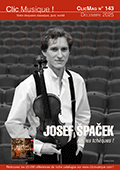|
|
|
Format : 1 CD
Durée totale : 01:13:44
Enregistrement : 23-27/07/2023
Lieu : Stuttgart
Pays : Allemagne
Prise de son : Studio / Stereo
Label : Challenge Classics
Référence : CC72965
EAN : 0608917296525
Code Prix : DM019A
Année d'édition : 2023
Date de sortie : 02/11/2023
Genre : Classique
|
|
 |
Oswald von Wolkenstein (1377-1445)
Wer ist, die da durchleuchtetWalther von der Vogelweide (1170-1230)
Unter der LindenJohann Sebastian Bach (1685-1750)
Der lieben Sonnen Licht und Pracht, BWV 446
O finstre Nacht, wann wirst du doch vergehen, BWV 492Joseph Haydn (1732-1809)
Die LandlustWolfgang Amadeus Mozart (1756-1791)
Abendempfindung an Laura, K 523Franz Schubert (1797-1828)
Auf dem Wasser zu singen, op. 72, D 774
Der Zwerg, op. 22/1, D 771
Im Abendrot, D 799Fanny Hensel (1805-1847)
Frühling, op. 7/3Felix Mendelssohn Bartholdy (1809-1847)
Neue Liebe, op. 19(a)/4Robert Schumann (1810-1856)
Die Fensterscheibe, op. 107/2
Abendlied, op. 107/6Johannes Brahms (1833-1897)
Sommerabend, op. 85/1Hugo Wolf (1860-1903)
Der FeuerreiterAlban Berg (1885-1935)
Quatre Lieder pour voix seule et piano, op. 2Aribert Reimann (1936-)
Nach dem LichtverzichtWolfgang Rihm (1952-)
Verweltke BlumenHanns Eisler (1898-1962)
Und endlich stirbt die Sehnsucht doch
Über den SelbstmordKurt Weill (1900-1950)
Berlin im Licht-SongChant grégorien (11e siècle)
Tria sunt munera
Anna Lucie Richter, mezzo-soprano
Ammiel Bushakevitz, vielle à roue, clavecin, clavicorde, pianoforte, piano
|
 
 A ce niveau d’accomplissement musical, il ne reste plus guère à discuter que le concept. 800 ans de mélodie allemande. L’acte de naissance de ce que nous appelons Lied est le "Abendempfindung" de Mozart. Quelques incunables pour commencer : mélopées de troubadours et chants spirituels de Bach. L’élégiaque "Auf dem Wasser zu singen" et le terrible "Der Zwerg" constituent bien l’alpha et l’oméga de l’univers Schubertien. De Brahms, on aurait aimé entendre "Feldeinsamkeit" plutôt que le modeste "Sommerabend". Le monstrueux "Feuerreiter" de Wolf pousse à ses extrêmes limites expressives un genre dont le XXème siècle ne saura plus vraiment que faire, comme en témoigne la sélection de mélodies de Berg à Rihm, avant un ultime chant grégorien pour boucler la boucle. "Licht", la lumière, comme fil conducteur, pourquoi pas. La nature, la nuit ou l’amour auraient également fait l’affaire. Ammiel Bushakevitch, après sa récente Meunière confirme son statut d’accompagnateur rêvé, par son intelligence des partitions, sa façon de donner à chaque note son juste poids, de respirer avec sa soliste jusqu’à lui prêter ses couleurs. L’éloge de la mezzo Anna Lucia Richter prendrait plusieurs pages, inutiles d’ailleurs, écoutez simplement "Im Abdendrot" : ce cœur qui se brise, qui l’a chanté avec autant de délicatesse et de tenue ? Excepté Lotte Lehmann, personne. (Olivier Gutierrez)  With the present programme we want to explore the history of the German Lied throughout a period spanning some 800 years, from that first light of dawn represented by the earliest music scored with modern notation - courtly love songs by Walther von der Vogelweide (1170-1230) and Oswald von Wolkenstein (1377-1445) - down to such present-day emissaries of the Lied tradition as Aribert Reimann and Wolfgang Rihm. In between we find: J.S. Bach, Haydn, Mozart, Schubert, Mendelssohn, F.Hensel, Wolf, Berg and Eisler. The programme is rounded off, however, by the work of a political exile, Kurt Weill: namely, Berlin im Licht. This work appears initially to be no more than a love-song to the future of the electric light bulb: “Turn on the light; so you can see what’s wrong and what is right”. The deeper meaning was soon thrown into relief by the blotting out, within a few years of its composition, of both the light and the right to which Kurt Weill aspired and Germany’s swift descent into the darkness of dictatorship and war. A spark, however, still remained.
 |
| . |
 |
|
|
